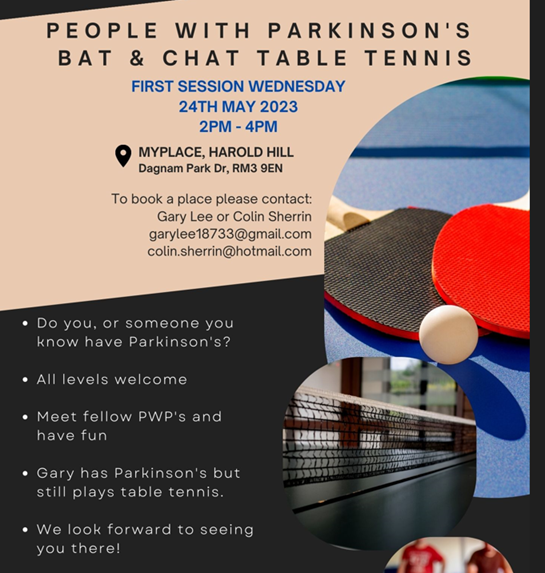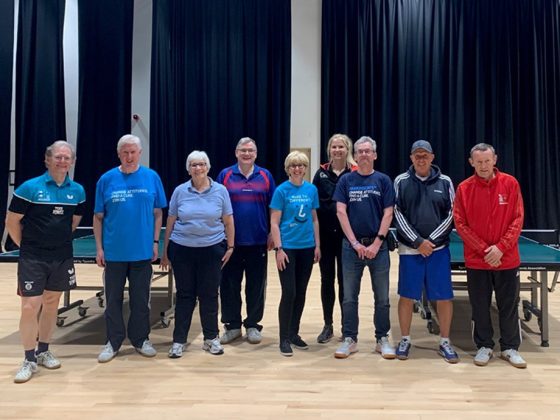Thanks to funding via Parkinson’s UK and Table Tennis England, clubs and community groups in England have been able to apply for small grants for projects encouraging People with Parkinson’s to play table tennis.
Growing research shows that regular physical activity can help manage the symptoms of Parkinson’s, and there are particular benefits associated with participating in table tennis.
A project in Harold Hill launched on May 24, and was opened by Parkinson’s UK Chief Executive Caroline Rassel, alongside session organiser and coach Colin Sherrin, co-organiser and person with Parkinson’s Gary Lee, and Table Tennis England Senior Area Manager Claire Warner. They are pictured above with participants at the session.
Following the first session, Colin, who runs myplace Community Adult TTC and has committee roles with Romford Table Tennis League, here shares how he and Gary organised the project, and some of the learnings to date.
When you already run a table tennis club, organise two sessions a week and have a healthy number attending each session and someone approaches you about running another session, you assume it is something you can just take in your stride.
If that somebody has Parkinson’s and has done so for 16 years and the idea is to run a People with Parkinson’s Bat & Chat session, then the undertaking suddenly becomes more daunting. The question then becomes ‘how do we organise this, what do we do to make it happen and be professional?’
Good questions . . . where do you begin?
Sitting down with Gary and starting to understand what having Parkinson’s means was a good start. Gary has Parkinson’s and has had an operation called Deep Brain Stimulation (DBS). He played in a Parkinson’s World Championship in Croatia in 2022.
When he plays table tennis, his mobility is reasonably good and his cognitive abilities as well, albeit he does get mentally tired very quickly. But this is not the same for all those who have Parkinson’s. Those with Parkinson’s can have around 40 different conditions that can impact them. This means one size does not fit all and presents a variety of different challenges when it comes to table tennis.
Initially we met and brainstormed what we needed to do. These meetings became a regular occurrence as the idea moved forward to ensure we kept ourselves focused on what we said we would do.
To start with, we decided funding for hall hire costs and equipment was needed. An approach to Parkinson’s UK and Table Tennis England secured £250 from each organisation, so money-wise we had funds to work with. We then needed to consider how to promote ourselves and encourage participation.
Searching the web for existing Parkinson’s groups was an obvious place to start. There are many activity and social clubs already offering interaction for people. These were our first ports of call and many telephone calls/emails were exchanged to start spreading the message about the idea.
The designing of a flyer to send to interested parties was also an obvious item to utilise. Likewise social media groups in the immediate area to the club. Having worked previously with the Borough Sports Development team meant messages across the Borough could be sent using their information links.
This led us to a Sports Centre that catered for ‘Sports for Disabilities’. We sent them a flyer and suddenly we were in medical centres, doctors’ surgeries and hospitals. Contacting the local radio station led to an audio interview giving our message and who to contact.
To build on what Parkinson’s means to those who have it, attendance at a Parkinson’s Club was an eye-opener. It put into context the challenges people with the condition face on a daily basis. It also allowed us to invite people to the Bat & Chat session through a short presentation on our aims. It provided an opportunity to also consider how we would deliver table tennis in a safe and social way so it was truly Bat & Chat.
Venues will often call for a Risk Assessment, so the existing club document was updated to include considerations for Parkinson’s users. Health and Safety considerations on the layout of the hall with the arrangement of tables, seating and the domestics as to fire exits and toilets were key items. A register of attendees in case of evacuation. Not rocket science items, but something that can be so easily overlooked when you are considering everything else.
To make the first session memorable, we decided we should approach the leading organisations who had helped to make this a reality. The CEO for Parkinson’s UK and the Senior Area Manager for Table Tennis England were invited and both were enthusiastic about attending and giving their support. To make things professional, a short welcome presentation was conducted with each organisation having a chance to speak. We even arranged for an allocated car parking space for the CEO!
The presentation emphasised that the session is about enjoyment, whether you are able to play or a beginner. It’s about socialising and meeting others and talking. We decided very early that the members dictate how they wish the event to run.
As far as coaching table tennis, what you know and how you coach becomes somewhat academic. Each person presents a different set of abilities, coaching becomes adaptive to their needs and what the person is able to do. Having helpers from the club to act as feeders helped a lot and was a godsend.
The biggest message we could give to all: Those with Parkinson’s, have Parkinson’s. They do not suffer with Parkinson’s. Parkinson’s has no hold over them, it does not define them or their lives. It just presents a few more challenges to be overcome.
If you, or someone you know, would like to find out more about the session in Harold Hill, see the flier below.
Click here to read more on Table Tennis England’s journey to support people with Parkinson’s or click here to watch our webinar from February. For information, advice and support about Parkinson’s, visit the Parkinson’s UK website or call the free, confidential helpline on 0808 800 0303.
Physical Activity Grants are currently available from Parkinson’s UK and applications close on November 20. Click here for more details.






